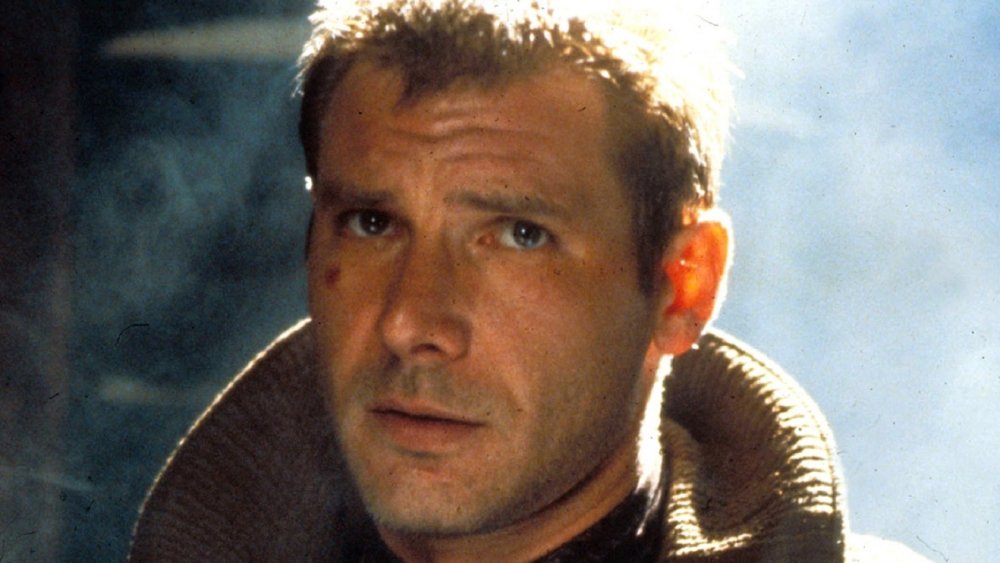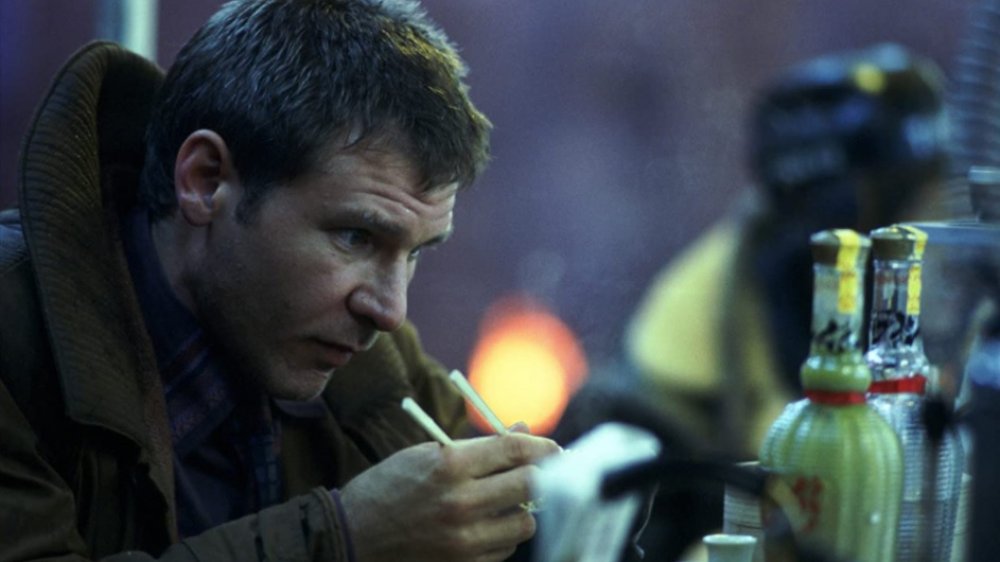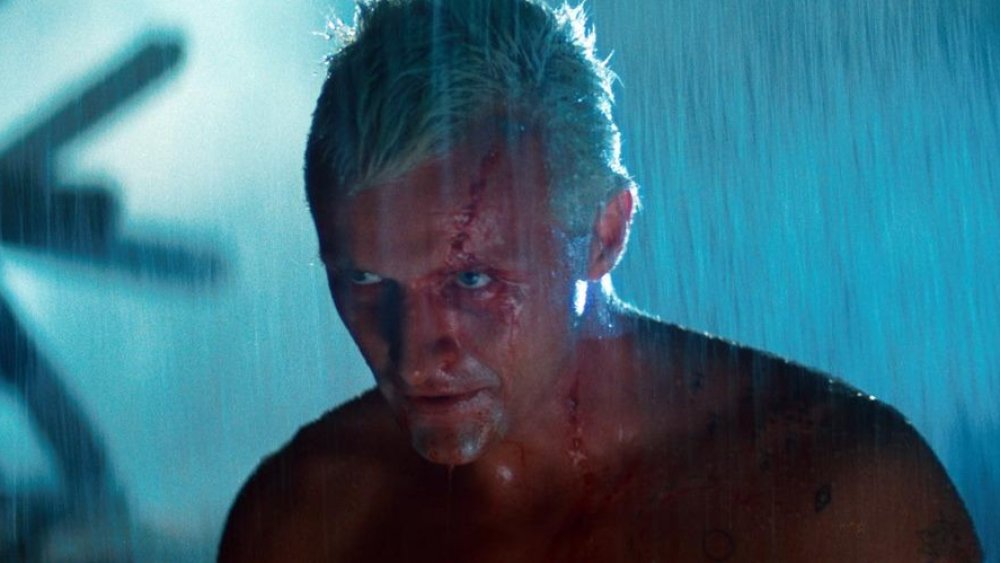One Of Harrison Ford's Most Important Movies Was A Total Box Office Flop
Harrison Ford is one of the biggest movie stars of his generation. Ever since his breakthrough 1977 turn as Han Solo in Star Wars, his very name has meant box office gold. He's proven himself capable of juggling multiple tentpole franchises, with 1981's Raiders of the Lost Ark launching the Indiana Jones series even as that original Star Wars trilogy was still at the forefront of the public consciousness, and his ability to get butts in theater seats transcends genre. From pure action (The Fugitive) to political thrillers (Patriot Games), from romantic comedies (Working Girl) to family adventures (The Call of the Wild), there's not much that Ford can't handle — but perhaps his most important contribution to cinema came in 1982, when he starred in Ridley Scott's visionary sci-fi epic Blade Runner.
Of course, as you may be aware, Blade Runner wasn't received quite as warmly upon release as one might expect for a film of its stature. Based loosely upon Philip K. Dick's 1968 novel Do Androids Dream of Electric Sheep?, the flick centers on Ford's Rick Deckard, a police officer tasked with hunting down "replicants" — lifelike humanoid androids with artificially limited lifespans who have gone rogue and attempted to integrate themselves into society after an uprising among their ranks. Aside from its heady themes of morality, mortality, and what it means to be human, Blade Runner astonished its audiences with a visual aesthetic quite unlike anything that had ever been seen on the big screen before, thanks in large part to the special effects work of veteran VFX artist Douglas Trumbull (2001: A Space Odyssey).
The film was a profound influence on modern sci-fi, and arguably one of the genre's greatest works — but when it hit screens in the summer of 1982, it did so with a resounding thud. During its initial theatrical run, Blade Runner managed only a $26 million haul — not even enough to cover its reported $30 million budget (via Variety).
Blade Runner was challenging for summer 1982 moviegoers
Perhaps unfortunately, studio Warner Bros. correctly surmised that Blade Runner might not find the multiplex to be a friendly place during the summer of 1982. It was a summer ruled by two slick, well-made, crowd-pleasing genre pictures: Steven Spielberg's E.T. the Extra-Terrestrial, and Rocky III, which moved that series from the realm of the sports drama into blockbuster territory. In an effort to render Blade Runner's narrative and themes a bit more easily digestible, Warner Bros. demanded that Scott include two elements which he was in no way fond of: an unambiguously upbeat ending, and voiceover narration by Deckard, which sounded for all the world like Ford had been forced to record it at gunpoint.
Those changes did not have the desired effect. Moviegoers purchasing a ticket to Blade Runner still found themselves knocked off-balance by the picture's bleak (albeit astonishing) visual sense, put off by the icy stoicism of Deckard, and troubled by the implication that the film's ostensible villains — the replicants, led by the terrifying Roy Batty (Rutger Hauer) — were virtual slaves, doomed with an awareness of their own lack of freedom and of the fleeting nature of existence.
As it happened, another film which trod similar thematic territory and opened on the same day as Blade Runner met with a similar box office fate: John Carpenter's sci-fi horror flick The Thing, which has also come to be lauded as a classic in the years since its release. While both of those movies went on to have a marked impact on the sci-fi genre, the influence of Blade Runner in particular has been towering. Without it, the whole of sci-fi cinema would almost certainly look very different today — and a number of classic films, and all of the movies that they influenced, might never have been made.
Blade Runner is one of the most influential sci-fi films of all time
It's worth noting that despite its initial box office failure, Scott was moved to continually tinker with Blade Runner until he felt that his original vision had been restored. His first director's cut of the film, released in 1992, didn't completely satisfy him, and it would be another 15 years before the version that he considered to be the definitive one (dubbed "The Final Cut") was released to home media in 2007.
Even the "compromised" theatrical cut, though, was enough to set off fireworks in the imaginations of many an aspiring filmmaker. The influence of the film's visual style and thematic complexity can be seen in the works of Alex Proyas (The Crow, Dark City), the Wachowskis (The Matrix), and Christopher Nolan (The Dark Knight), to name just a few — and the filmmakers who followed in the footsteps of those giants likewise owe Blade Runner a debt of gratitude. For that matter, video games from Bioshock to Deus Ex to Observer (which even features a protagonist voiced by Hauer) have also benefited from the visual template established by Scott, Trumbull, and Blade Runner's concept artist, the late futurist Syd Mead.
It may not have set the world on fire in 1982, but the impact of Blade Runner on cinema, and in pop culture in general, would be difficult to overstate. Take it from the professionals: in 2019 (coincidentally, the year in which the film was set), the American Society of Cinematographers named Blade Runner as the second-most influential "milestone" film of the 20th century, behind only David Lean's 1962 historical epic Lawrence of Arabia. The flick regularly appears on lists of all-time top sci-fi movies, and the likes of The Guardian and New Scientist have gone so far as to name Blade Runner as the single greatest science fiction film of all time.


